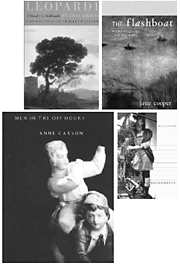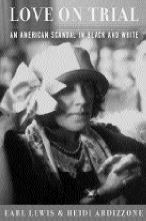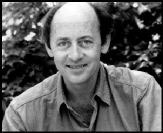Giacomo Leopardi (1798-1837), the great Italian poet, is radiant again in a fresh translation, Leopardi: Selected Poems (tr. Eamon Grennan, Princeton University Press, $9.95) that appeared just as Iris Origo’s marvelous 1935 biography Leopardi, A Study in Solitude (Books & Co., $16.95) was reissued. Leopardi’s birth into an aristocratic Tuscan family was no protection against a case of scoliosis that left him hunchbacked, a permanent invalid, unlovable in the eyes of any woman he might come to love. Yet his poetic world is often as enchanting and full of health as a convalescent’s, for whom all things come alive and “roofs and meadows and little hills/Are shining in the sun.” Leopardi celebrates such moments of renewal and delight, though self-forgetful pleasures always return him to a lonely prison.
But this is the human condition, not just the poet’s. Nature “drives all things to their destruction,” the “feast-day is over in a flash,/The work-day comes on, and time takes away/All we are and do.” So, he asks, why not love one another? Why turn cold or quarrel, when death sweeps everyone into darkness?
Jane Cooper, one of the more thoughtful, sharp-eyed women of the American century, echoes Leopardi’s questions and joys in the original, arresting poems she began writing during World War II and is still producing. A lifetime of her poetry and prose is now collected in a fine, big hardback, The Flashboat (W.W. Norton, $23.95). One love poem begins, “Darling, I had my hand on your khaki/knee, the air was shining, the murmur/of small summer grass and insects came in”—”khaki” invading erotic bliss like the distant ack-ack of machine guns. Cooper is “bitten by the tides/Of knowledge as sea-tides bite at a beach.” She learns that “Being Southern” is “like being German, . . . At their backs/the six million.” Whenever Cooper writes, she tries to make “a poem that will alert me to my real life,” and in doing so she alerts us to ours. The flashboat—her lucky lifeboat—is this work.
Anne Carson‘s two previous books string their wonderful perturbations along narrative lines, but Men in the Off Hours (Knopf, $24) is a deliberately unstrung chaos that Carson calmly, almost academically, sorts through. Metaphor, she decides, is “the willful creation of error,” and poetry consists of misunderstandings and mistranslations (even by a classics professor such as herself). Since “The fact of the matter for humans is imperfection,” the poet must try not only to accept mistakes but to enjoy them. Can she learn to accept the death of her mother as a kind of mistake or to enjoy having taken as her “true love” a man who left her?
Such a wholesale interpretation of the book is risky. Carson is always, as she says in Men, “uneasy with any claim to know exactly/what a poet means to say,” and her poetry generally avoids the confessional mode. But this collection is filled with refugees from torments as searing as love’s betrayal. Lazarus, the mad Artaud, Anna Akhmatova, the birds Audubon shot, wired, and plumped into lifelike poses—their agony tells us truths. So do Carson’s wisecracks, little word salads, and sardonic hurrahs (“At our backs is a big anarchy. If you are strong you can twist a bit off/and pound on it—your freedom!”). This is a wickedly disquieting book, with footnotes. Its reassurances are its glinting intelligence and a confident, humorous voice—when Carson read in Seattle last month, every syllable was as clear and knowing as laughter.
J.D. McClatchy, in a beautifully designed collection, 10 Commandments (Knopf, $15), tests each commandment against the life he knows. The 10 of them take us around a global marketplace and down the ages to a saint’s house, the Ho Chi Minh trail, a public toilet, Nero’s palace, and the brothel bed of Proust compulsively reenacting his gruesome version of the Freudian drama. Eichmann buys a newspaper and absently waves away flies with it, his ordinary gesture as disturbing as history. A diver sucked up with tons of water by a military plane is dumped into a forest fire. A soreness around the poet’s nipple sends him for a mammogram. On July 4 a town parades its “rag-tag march of convictions” around “history’s phantoms.”
But the book is rich, not miscellaneous—an orchestration of formal masterpieces from the depths of which the reader emerges to see each Commandment anew. “Honor thy father and mother” is amplified by a lab experiment in obedience about which McClatchy sighs, “People will do what they are told to do,” and by Proust’s perversion, which reveals “The mysterious/laws drawn through our lives//Like a mother’s hand through her son’s hair.” McClatchy has compassion for all that he sees, knowing the lines of yearning and terror long ago laid down. He understands our willed ignorance, “the common desire to learn/Less than had been supposed,” and admits his own complicities—self-medicating with alcohol, retreating into soft, uneasy sleeps. With McClatchy, we’re both lost and discovering where we are, both baffled and making sense.
J.D. McClatchy will give this year’s Roethke Reading at UW’s Kane Hall, Thursday, May 25, at 8pm.








